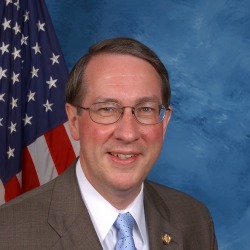“Preventing the President from overstepping the boundaries of his constitutional authority is not about partisan politics. It is about preserving the fundamental premise of our constitutional design: that a limited government, divided into three separate branches exercising enumerated powers, is necessary to protect individual liberty and the rule of law.”
February 26, 2014 Statement of House Judiciary Committee Chairman Bob Goodlatte
Chairman Goodlatte: Since taking office President Obama has increasingly pushed the boundaries on executive power beyond their constitutional limits. He has repeatedly declared that, rather than faithfully executing the laws passed by the legislative branch, he will “refuse to take ‘no’ for an answer” and that “where [Congress] won’t act, I will.” These have not been empty proclamations.
From Obamacare to welfare and education reform, to our nation’s drug enforcement and immigration laws, President Obama has been picking and choosing which laws to enforce.
Video: Goodlatte Questions Witnesses on Executive Overreach
But the Constitution does not confer upon the President the “executive authority” to disregard the separation of powers and write, or rewrite, Acts of Congress. It is a bedrock principle of constitutional law that the President must “faithfully execute” the laws. The President has no authority to bypass Congress and unilaterally waive, suspend, or amend the laws based on his policy preferences.
President Obama’s actions have pushed executive power beyond all limits and created what has been characterized as an “uber-presidency.”
The question that arises from the President’s end-runs around the legislative branch is: What can Congress do to check these broad assertions of power and restore balance to our system of separated powers?
Traditionally, to check presidential excesses Congress has passed legislation to defund programs the executive branch administers and withheld confirmation for executive branch nominees. However, when the President ignores or rewrites the very legislation that places limits on his authority and circumvents the Senate confirmation process, the traditional methods of counteracting presidential ambition won’t work to preserve the separation of powers. So what can be done?
The Members of Congress on our first witness panel have all introduced legislation to attempt to check presidential failures to faithfully execute the law. These proposals include: requiring the Executive Branch to report to Congress any time it adopts a policy to refrain from enforcing federal law; and requiring the administration to eliminate a position within the Immigration and Customs Enforcement agency that Congress has already defunded.
Two of the most widely discussed proposals involve authorizing one House of Congress to seek judicial review of the President’s failures to faithfully execute the laws. Asking the Judiciary—a co-equal branch of our government—to step-in and check one of the other branch’s failures to stay within its constitutional limits would seem to be an obvious solution.
Unfortunately, the courts have been reluctant to exercise their constitutionally conferred power to say what the law is when doing so would require them to determine whether either of the political branches has exceeded its authority. Instead, when presented with cases and controversies involving disputes between the President and Congress, the federal courts have used judge-made doctrines to avoid judicial review of these inter-branch conflicts.
But this hostility toward deciding separation of powers disputes is not the role that the Constitution’s framers envisioned for the Judiciary. The framers did not expect the Judiciary to sit on the sidelines and watch as one branch aggrandized its own powers and exceeded the authority granted it by the Constitution.
Rather, the Constitution grants the federal courts very broad jurisdiction to hear “all Cases . . . arising under this Constitution [and] the Laws of the United States.”
However, over time, the federal courts have read their own powers much more narrowly, refusing to exercise a vital check over unconstitutional action by the executive branch. When the courts refuse to step in and umpire these disputes, they cede the field to this and future Presidents. They effectively make the constitutional requirement that the President “take care that the laws be faithfully executed” an unenforceable and meaningless check on executive power.
It is up to the Congress and the courts to check the President’s overreach and restore balance to our system of government.
Preventing the President from overstepping the boundaries of his constitutional authority is not about partisan politics. It is about preserving the fundamental premise of our constitutional design: that a limited government, divided into three separate branches exercising enumerated powers, is necessary to protect individual liberty and the rule of law.
As James Madison warned centuries ago in Federalist 47, “the accumulation of all powers legislative, executive and judiciary, in the same hands . . . may justly be pronounced the very definition of tyranny.”
I look forward to hearing from all our witnesses today.
 Bob Goodlatte represents the Sixth Congressional District of Virginia in the United States House of Representatives.
Bob Goodlatte represents the Sixth Congressional District of Virginia in the United States House of Representatives.
Bob’s service to the people of the Sixth District began in 1977 when he became District Director for former Congressman Caldwell Butler. He served in this position for two years until 1979, and was responsible for helping folks across the District seeking assistance with or encountering problems from various federal agencies. In 1979, he founded his own private law practice in Roanoke. Later, he was a partner in the law firm of Bird, Kinder and Huffman, working there from 1981 until taking office.
